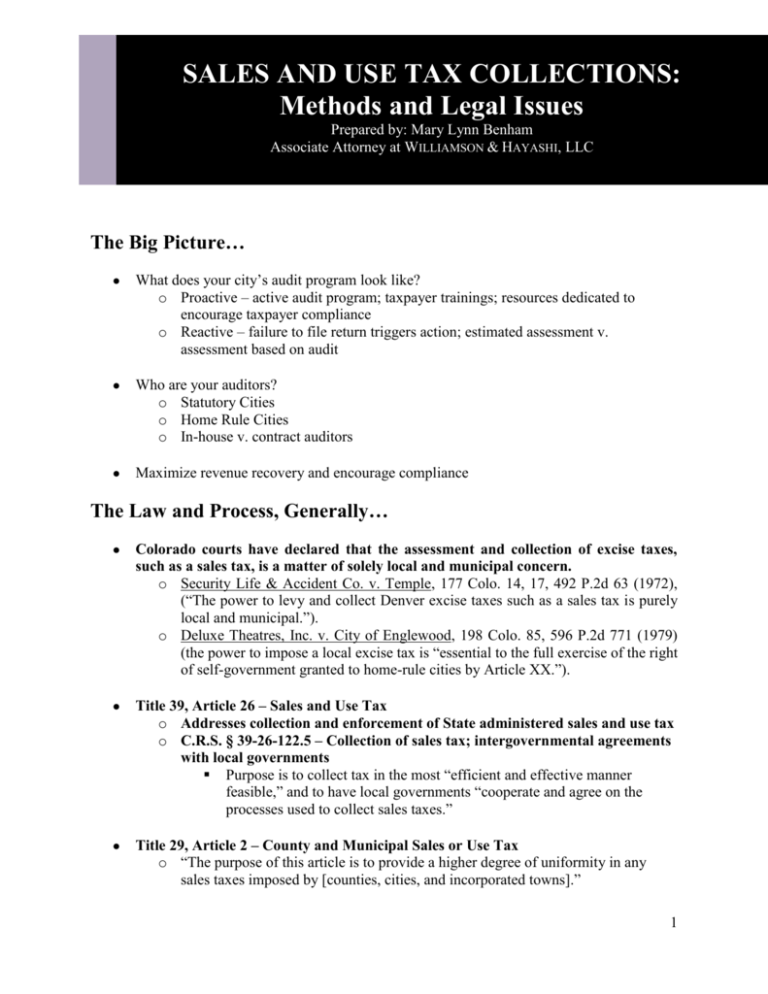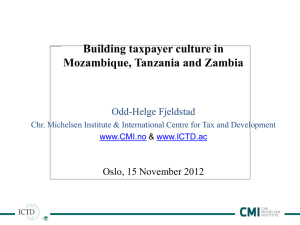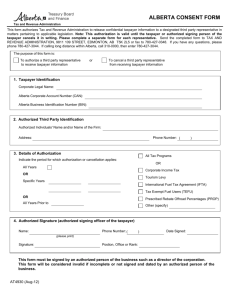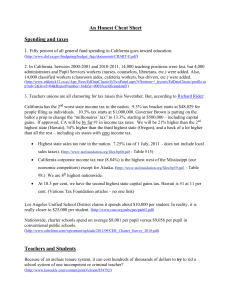SALES AND USE TAX COLLECTIONS: Methods and Legal Issues
advertisement

SALES AND USE TAX COLLECTIONS: Methods and Legal Issues Prepared by: Mary Lynn Benham Associate Attorney at WILLIAMSON & HAYASHI, LLC The Big Picture… What does your city’s audit program look like? o Proactive – active audit program; taxpayer trainings; resources dedicated to encourage taxpayer compliance o Reactive – failure to file return triggers action; estimated assessment v. assessment based on audit Who are your auditors? o Statutory Cities o Home Rule Cities o In-house v. contract auditors Maximize revenue recovery and encourage compliance The Law and Process, Generally… Colorado courts have declared that the assessment and collection of excise taxes, such as a sales tax, is a matter of solely local and municipal concern. o Security Life & Accident Co. v. Temple, 177 Colo. 14, 17, 492 P.2d 63 (1972), (“The power to levy and collect Denver excise taxes such as a sales tax is purely local and municipal.”). o Deluxe Theatres, Inc. v. City of Englewood, 198 Colo. 85, 596 P.2d 771 (1979) (the power to impose a local excise tax is “essential to the full exercise of the right of self-government granted to home-rule cities by Article XX.”). Title 39, Article 26 – Sales and Use Tax o Addresses collection and enforcement of State administered sales and use tax o C.R.S. § 39-26-122.5 – Collection of sales tax; intergovernmental agreements with local governments Purpose is to collect tax in the most “efficient and effective manner feasible,” and to have local governments “cooperate and agree on the processes used to collect sales taxes.” Title 29, Article 2 – County and Municipal Sales or Use Tax o “The purpose of this article is to provide a higher degree of uniformity in any sales taxes imposed by [counties, cities, and incorporated towns].” 1 C.R.S. § 29-2-106 – Collection - administration – enforcement o (1) Performed by the executive director of the department of revenue in the same manner as the collection of state sales tax. Collection, administration and enforcement is governed by C.R.S. § 39-26, unless otherwise provided in C.R.S. § 29-2. HR municipalities can self-collect or elect to have Department of Revenue collect o (4)(c) – Taxpayer information is confidential! Except in accordance with a judicial order or other legal exception, municipal officials and employees are prohibited from disclosing: Any information that identifies the amount of sales tax collected or paid by a licensed taxpayer; or Any information that permits the identification of the amount of sales tax collected or paid by a licensed taxpayer. Be wary of anything that could lead to the connection of a taxpayer with a certain amount of tax paid by that taxpayer! Settlement agreements Proprietary information Misdemeanor for “willful” violation, and dismissal from office upon conviction o (8) “Uniform collection procedures. Each home rule city, town, and city and county shall follow, and conform its ordinances where necessary to, the statute of limitations applicable to enforcement of state sales and use tax collections … and refunds of state sales and use taxes, the amount of penalties and interest payable on delinquent remittances of state sales and use taxes, and the posting of bonds pursuant to section 39-21-105(4), C.R.S.” Conflict with HR autonomy? See Winslow Construction Co. v. City & County of Denver, 960 P.2d 685 (Colo.1998) (statute of limitations established by state statute cannot be applied to home-rule municipalities). C.R.S. § 29-2-106.1 – Deficiency Notice and Dispute Resolution o General Assembly declares that dispute resolution arising out of the enforcement of sales and use taxes is a matter of statewide concern for which the procedures in this section shall be applied uniformly throughout the state. o This section outlines the procedure for dispute resolution between taxing authorities and taxpayers. o Governs the notice, hearing, and appeal process for disputes between the taxpayer and the taxing authority, from local level to the courts. HR municipalities retain a small measure of autonomy with respect to the protest and hearing process at the local level. 2 MDC Holdings, Inc. v. Town of Parker, 223 P.3d 710 (Colo. 2010). Locally-prescribed appellate procedure governing appeals of sales and use taxes disputes, which required a formal hearing following the informal hearing, and limited appeal to abuse of discretion or excess of jurisdiction standard of review, irreconcilably conflicted with, and, thus, was superseded by statute governing dispute resolution in matters of enforcement of sales and use taxes, which provided for only an informal hearing before the local government, and required de novo standard of review. o Taxpayer must “exhaust local remedies” before appealing to Department of Revenue or district court – see C.R.S. § 29-2-106.1(2)(c) “Exhaustion of local remedies” means: Taxpayer timely requests in writing a hearing before local government, and local government has issued decision thereon. o Hearing shall be informal. Per MDC Holdings, supra, a municipality cannot require an informal and formal hearing at local level; i.e., cannot require more process than C.R.S. § 29-2-106.1 requires o Briefs may be submitted, upon election by taxpayer. o Decision of local government must be issued within 90 days from date of the taxpayer’s request for a hearing, or within 180 days if there is a delay caused by taxpayer OR Taxpayer timely requests in writing a hearing before local government, and local government fails to hold a hearing or fails to issue a decision thereon within 90 days (or 180 days if delay caused by taxpayer). Once local remedies are exhausted, the taxpayer may: o Appeal from Local Level to Executive Director: Taxpayer has 30 days after decision by local government or exhaustion of local remedies to request a hearing before the Executive Director of the Department or Revenue. See C.R.S. § 29-2106.1(2)(c), (3) Appeal from Executive Director to District Court: Either the taxpayer OR the local government may appeal the decision of the Executive Director to district court. See C.R.S. § 29-2-106.1(7), 39-26-105. OR o Appeal from Local Level to Directly District Court: If there is only one local government involved, then taxpayer may appeal directly to district court, within 30 days after decision by local government or exhaustion of local remedies. C.R.S. § 29-2-106.1(8). If there is more than one local government involved, taxpayer must appeal a local decision to the Executive Director. o Review is de novo at all levels. See C.R.S. § 29-2-106.1(3)(d), (7). 3 You’ve discovered sales or use tax deficiencies through your excellent audit program… Now what? ASSESS THE TAXPAYER Notice of Deficiency – C.R.S. § 29-2-106.1(2)(a) o Must be sent via certified mail HR may designate other verifiable delivery methods o Must state the local sales and use taxes due o Must contain “notification, in clear and conspicuous type, that the TAXPAYER HAS THE RIGHT TO ELECT A HEARING ON THE DEFICIENCY PURSUANT TO” C.R.S. § 29-2-106.1(3); i.e., hearing before the Executive Director. o Good to have: Correct name of taxpayer Deadline for payment of deficiency Deadline to protest deficiency Notice that taxpayer may elect hearing before local government on deficiency, and that request must be submitted in writing, stating reasons for taxpayer’s belief that tax is not due. Notice that unpaid tax constitutes a lien on the real and personal property of the taxpayer Taxpayer will either pay, not pay, or protest the assessment o The taxpayer should pay any unprotested tax, penalty and interest within the deadline to protest the assessment. If taxpayer pays, your client is happy; no further action is needed. If taxpayer protests → Dispute Resolution Process (C.R.S. § 29-2-106.1): o Taxpayer must request hearing in writing, and set forth factual and/or legal basis for believe that tax is not due o Informal hearing before hearing officer (usually municipal treasurer) o Hearing officer issues final determination within 90 days after written protest o If decision is in favor of municipality, taxpayer may appeal hearing officer’s decision per C.R.S. § 29-2-106.1. Taxpayer must exhaust local remedies! Courts will look to C.R.S. § 29-2106.1 to determine whether local remedies exhausted. HR municipal code provisions that conflict with C.R.S. § 29-2-106.1 are superseded by C.R.S. § 29-2-106.1. (MDC Holdings, Inc. v. Town of Parker, 223 P.3d 710 (Colo. 2010). Town’s “locally-prescribed appellate procedure-requiring a formal hearing following the informal hearing and C.R.C.P. 106(a)(4) reviewirreconcilably conflicts with section 29-2-106.1 providing for only an informal hearing before the local government, a final decision by the local government within ninety days of the taxpayer's request for the informal hearing, and the 4 taxpayer's right to appeal to either the Executive Director and then to the district court where the local government is located or directly to the district court if only one local government is involved” (emphasis added). Failure to exhaust local remedies or to timely request a hearing (exhaustion of local remedies + 30 days) = jurisdictional bar to appeal PROCEDURE IS KEY! The taxpayer has refused to pay or failed to protest, and your municipality wants to collect … Now what? METHODS OF ENFORCING COLLECTION TAX LIEN Attaches to taxpayer property as soon as tax deficiency accrues Lien may be filed after taxpayer has notice of tax due and fails to pay Lien is prior to all other liens or claims with respect to retailer goods and business fixtures Lien is prior to all other liens and claims on taxpayer’s real and tangible personal property, EXCEPT as to preexisting claims or liens of bona fide mortgagee, pledgee, judgment creditor or purchaser whose rights attached prior to filing of the notice of lien. C.R.S. § 39-26-118 – Recovery of taxes, penalty, and interest - If any tax, penalty, and interest imposed by Article 26 of Title 39 is not paid within 5 days after due, Executive Director shall issue a notice of deficiency setting forth: o Name of taxpayer o Amount of tax, penalties and interest o Date of accrual (assessment period) o State of Colorado claims a first and prior lien for the TPI on the real and personal property of the taxpayer except as to preexisting claims or liens of bona fide mortgagee, pledge, judgment creditor, or purchaser whose rights have attached prior to the filing of the notice, other than the goods, stock in trade, and business fixtures of the taxpayer Filing of the notice of deficiency with county clerk and recorder “shall create such lien on such property in that county and constitute notice thereof.” C.R.S. § 39-26118(3)(b). PRIORITIES o Sales Tax - C.R.S. § 39-26-117 – Sales tax “shall be a first and prior lien upon the goods and business fixtures of or used by any retailer or qualified purchaser … and shall take precedence on all such property over other liens or claims of whatsoever kind or nature.” A lien for sales taxes takes priority over a security interest that previously attached. Young v. Golden State Bank, 632 P.2d 1053 (Colo. App. 1981) 5 A lien for sales taxes under this article is a first and prior lien on goods and business fixtures and has priority over a prior perfected security interest. ITT Diversified Credit Corp. v. Couch, 669 P.2d 1355 (Colo. 1983); Wimmer v. Jenkins, 703 P.2d 1326 (Colo. App. 1985). o Use Tax – C.R.S. § 39-26-205 – Use tax is a first and prior lien on the tangible personal property stored, used or consumed, subject only to valid mortgage or other liens of record on and prior to the recording of notice as required by C.R.S. § 39-26-118(3). Use tax also a first and prior lien on goods, stock, or business fixtures of retailer if such tax is collected by retailer. Home Rule Municipalities o COLO. CONST. Art. XX gives broad power to levy, collect, and enforce sales and use taxes. o Includes power to impose liens upon real and personal property of taxpayers to enforce collection of unpaid tax. Town of Avon v. Westar Bank, 151 P.3d 631 (Colo. App. 2006) o C.R.S. § 29-2-107(1) - Nothing in this article shall be construed to apply to, affect, or limit the powers of home-rule municipalities organized under Article XX of the state constitution to impose, administer, or enforce any local sales or use tax, except those provisions which specifically refer to “home-rule.” (emphasis supplied) o Home rule cities have authority under Art. XX of Colorado Constitution to designate municipal sales and use tax lien as a first and prior lien on personal property of retailer, even over prior perfected security interests. Town of Avon v. Westar Bank, supra. TO COLLECT LIEN AMOUNT, municipality may: o seize and sell personal property, goods, and business fixtures of taxpayer, or o foreclose upon real property of taxpayer, or o file a civil action in district court to enforce lien on real property. In order to enforce liens for sales taxes, the Department of Revenue may activate its liens by recording the notice of deficiency pursuant to C.R.S. § 39-26-118 or by the more immediate means of distraint in accordance with C.R.S. § 39-21-114. DISTRAINT AND SALE - Seizure and sale of taxpayer property to satisfy assessment C.R.S. § 39-21-114 – Details the process for exercising power of distraint, and penalties against taxpayer for multiple distraints. o Issuance distraint warrant – C.R.S. § 39-26-118(3)(b), (4). Sherriff or revenue collector levies upon property of taxpayer to satisfy taxes due Sale of property - Property shall be “sold in all respects with like effect and in the same manner as is prescribed by law in respect to executions against property upon judgment of a court of record, and the remedies of garnishments shall apply.” C.R.S. § 39-26118(4). 6 Cannot levy upon property exempt from a tax lien under C.R.S. § 39-26-117(1)(b) Distraint and sale for collection of USE TAXES is the same: C.R.S. § 39-26-204(3) “… The procedure for assessing and collecting [use] taxes from such retailers or agents, or from the user when not paid to a retailer or agent, shall be the same as provided in this article and article 21 of this title for the collection of sales taxes, including collection by distraint warrant, …” The taxpayer is about to skip town or sell its business to avoid paying tax owed, and your municipality wants to collect … Now what? JEOPARDY ASSESSMENT C.R.S. § 39-21-111 - If the executive director of the department of revenue finds that collection of the tax will be jeopardized by delay, in his discretion, he may declare the taxable period immediately terminated, determine the tax, and issue notice and demand for payment thereof; and, having done so, the tax shall be due and payable forthwith, and the executive director may proceed immediately to collect such tax as provided in section 39-21-114 [Distraint Procedure]. o HR codes have similar language Flores v. Dept. of Rev., 802 P.2d 1175 (Colo. App. 1990). Where jeopardy assessment made without notice of deficiency, and a distraint warrant and seizure have been pursued under C.R.S. § 39-21-114, the taxpayer has no right to an administrative hearing under C.R.S. § 39-21-103, but the taxpayer may sue the executive director of the Dept. of Revenue in district court under C.R.S. § 39-21-114(6) or proceed under APA. o Presumably, taxpayer could challenge municipality’s treasurer in C.R.C.P. 106(a)(4) action for abuse of discretion or exceeding jurisdiction Van Dorn Retail Mgmt., Inc. v. Denver, 902 P.2d 383 (Colo. App. 1994). Tax lien statutes and ordinances which provided for enforcement of tax liens pertaining to retailer's delinquent sales taxes against consigned goods did not violate procedural due process rights of consignor which was notified before seizure that city would proceed with jeopardy assessment and which received hearing regarding the seizure. OTHER METHODS OF COLLECTION SUMMONS TO MUNICIPAL COURT for violation of sales and use tax code (if municipal code permits) LIQUOR LICENSING – Failure to pay municipal sales or use taxes can be grounds for denial of liquor license renewal; payment of tax deficiency can be condition of renewal or issuance of liquor license 7 ACTION AT LAW o Civil action to collect debt: Municipal treasurer may treat unpaid sales/use taxes, penalty and interest as a debt due to municipality from taxpayer, and seek enforcement in county or district court. Return or assessment (notice of deficiency) is prima facie proof of the amount due. o Action in attachment o Civil action to enforce lien on real property – C.R.S. §§ 39-20-101 - 107 OTHER CONSIDERATIONS STATUTE OF LIMITATIONS Municipality may collect tax up to 3 years after the date tax became payable. Taxpayer may agree to extension of limitation before the period of limitations expires Some home rule cities have automatic tolling provisions, e.g., Golden’s municipal code automatically tolls the statute of limitations starting on the date the taxpayer is engaged for an audit. Statutes: o Sales tax – C.R.S. § 39-26-125 o Use tax – C.R.S. § 39-26-210 Exceptions to statute of limitations – Tax may be collected at any time when deficiency due to false or fraudulent return with intent to evade tax. DON’T FORGET PENALTIES AND INTEREST! C.R.S. § 39-26-115 – Deficiency due to negligence or fraud o Add 10% penalty for negligence or intentional disregard, without intent to defraud. o Add 100% penalty if any part of deficiency is due to fraud with intent to evade tax. Filing of a false or fraudulent return with intent to evade tax is a felony. C.R.S. §§ 39-21118, 39-26-120. HR municipalities may set their own penalties and interest rates on tax deficiencies 8






